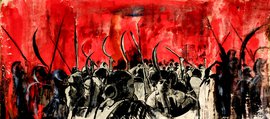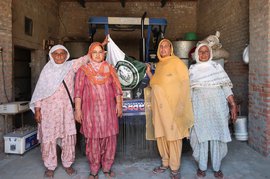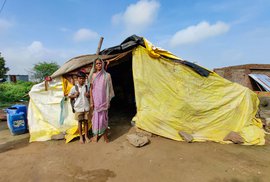On February 13, 2024, Davinder Singh Bhangu, a sociology student from Punjab, went to the Shambhu border with his friends to join the farmers’ protest. When they reached at around 2 p.m., the Rapid Action Force (RAF) and the police on the Haryana side of the border were already in action.
Davinder’s friend Taranveer Singh says, “a rubber pellet hit him in the left eye when we were standing peacefully in a group. Davinder fell immediately. As we tried to pick him up, the police fired three or four tear gas shells at us.” It all happened around 3 p.m., within an hour of their arrival at the protest site.
Farmers began their peaceful march to Delhi on February 13, 2024, demanding legal guarantee for MSP (minimum support price) among other issues. They were stopped at Shambhu border between Punjab and Haryana by the police and RAF. Barricades had been set up to prevent them from marching. When the farmers tried to march on, they were attacked with tear gas shells and rubber pellets (Also read: 'I feel imprisoned at Shambhu border' ).
Braving the pungent smoke from the tear gas shells, Davinder’s friends sprang into action, quickly picking him up while he bled profusely. They took the 22-year-old to the government hospital in Banur in an ambulance, around 20 kilometres from the spot. The doctors there referred him to the Government Medical College and Hospital in Chandigarh where his eye was operated upon on February 15. The doctors say there is little chance of him regaining his vision in the left eye.
Davinder’s father Manjit Singh, a farmer, told the media that his son decided not to go abroad and instead stay and prepare to join the police force.


Left: Davinder Singh Bhangu went to the Shambhu border with his friends to join the farmers’ protest. Within an hour of their arrival, he was struck in his left eye by a pellet fired by the forces and had to be rushed to the hospital. Right: His father, Manjit Singh, said that Davinder had chosen not to go abroad so that he could prepare to join the police force


Left: Farmers moving towards the make-shift stage set up on a tractor at Shambhu . Right: A poster put up by the protesting farmers says – 'We are farmers, not terrorists'
The family owns eight acres of land in the village of Sheikhupur in Patiala district and participated in the farmers’ protest against the three farm laws at the borders of Delhi in 2020-21. Read PARI stories on the movement: Protest against farm laws: full coverage .
Farmers at the protest site want to know how the Haryana police are able to shoot pellets and tear gas shells in the jurisdiction of Punjab. “If we are not safe in our state, where will we be?” they ask and add that the police have targeted peaceful protesters. “The Punjab government should do something,” they say.
A farmer leader, Guramneet Singh told PARI that they raised this issue with the Punjab Police and even the Deputy Commissioner. They were told that the police have spoken with their counterparts in Ambala. But the tear gas shelling is yet to stop.
More than 100 protesting farmers have been injured due to the use of water cannons, tear gas shells and pellets. Three have lost their eyes. The health minister even condemned the Haryana police for its ‘unprovoked’ action on the farmers.
Jarnail Singh, a farmer from Dhariwal village in the district of Tarn Taran was hit in the head during a laathi charge on February 13. The 44-year-old has received five stitches in the head, but does not wish to return home. “Everyone is here protesting, why would I go home to my village,” he says.
Dr. Mandeep Singh, who is running a medical camp
at the protest site said that they have tended to at least 400 patients with
injuries and ailments since the protest started.


Left: Farmers have come to the protest prepared with their trolley houses. Right: Dr Mandeep Singh attending to Jarnail Singh who was hit in the head during a lathi charge and had to get five stitches


Left: Farmer unions have started providing signed IDs to journalists after several were attacked by miscreants. Farmer leader Ranjit Singh Raju (centre) notes down details of journalists and informs them about the volunteers to help them in any situation. Right: A ppointed volunteers act as guards or Pehredars of the farmer unions keep a check on miscreants
Punjab’s health minister, Dr. Balbir Singh, himself a practicing eye surgeon, has been visiting patients who have been injured during the protest. On February 14, he announced that all treatment costs of farmers injured during the protest will be borne by the Punjab government.
Several media persons have also been heckled and attacked by miscreants at the protest site. To aid the press, and to contain such miscreants, the farmer unions have appointed volunteers as pehredars or guards to keep a check.
The unions are also issuing media cards
authorised by them to the journalists coming to cover the protest. Farmer
leader Ranjit Singh Raju says it is for the safety of the journalists. The card
contains details of the journalist and is signed by a leader who is noting down
their details in a register.
*****
Like Davinder, many at the protest site at Shambhu border were also involved in the protests of 2020-2021.
Baba Labh Singh, member of a kaar sewa team, lost his cousin during the protest at Delhi border. “My cousin Ajaib Singh died of pneumonia at the protest site. His wife had passed away earlier. His two children have been orphaned,” the 62-year-old says, addressing a gathering at Shambhu border on February 18.
“During elections, these people come with folded hands to us, but do not lend a listening ear when we come with our demands,” he continues and adds that while governments come and go, people always have to fight for themselves.


Left: Baba Labh Singh, who lost his cousin brother in the 2020-21 agitation addresses farmers at Shambu. Right: Harbhajan Kaur (right) has travelled for two days to reach Shambhu. 'My son did not want to bring me here but I persisted,' she says
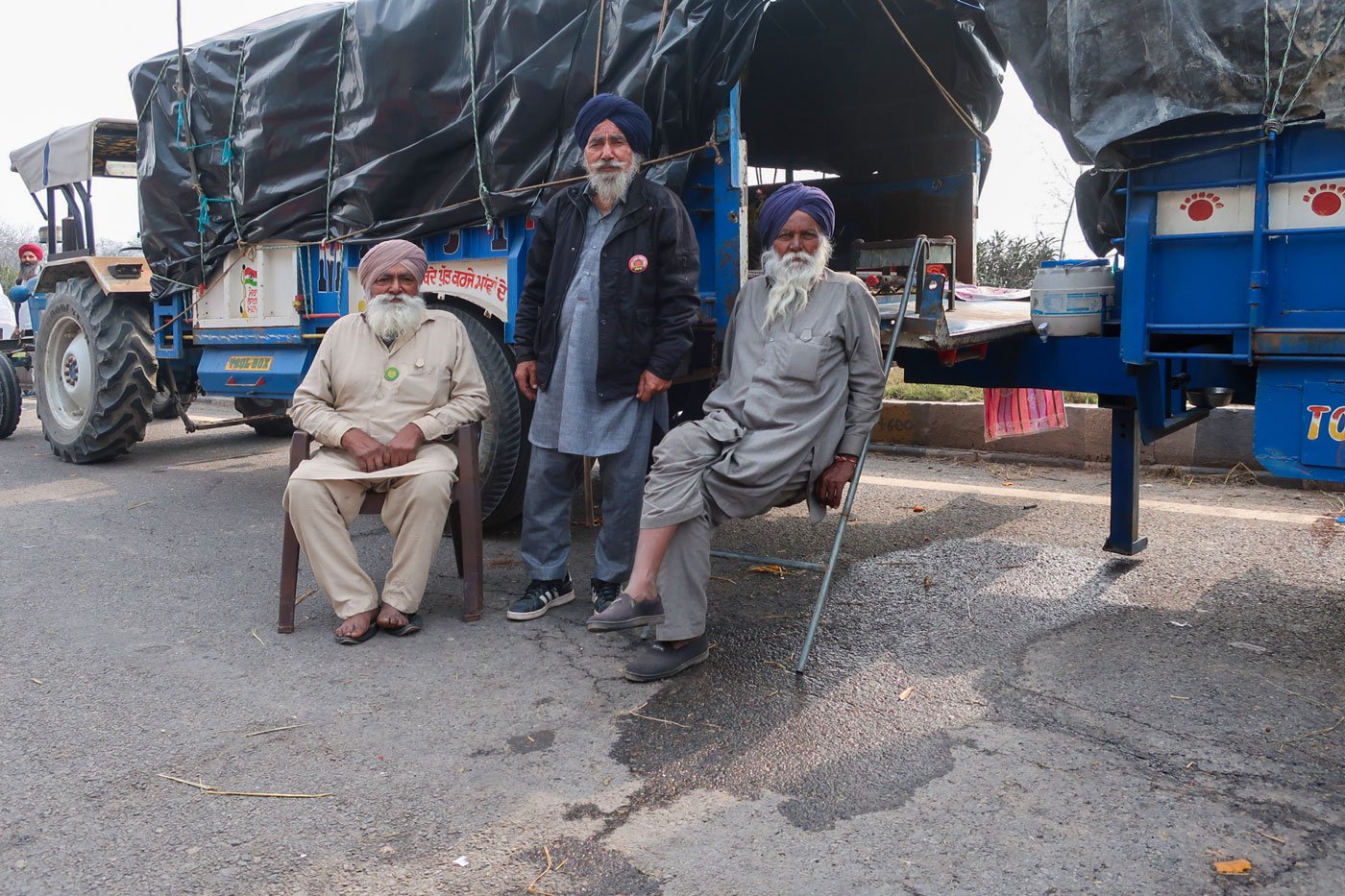
![Right: Like many of the protestors, the vehicles at Shambhu border were also a part of the 2020-21 protests. The quote on this tractor reads: 'Haar paawange, haar puaawange...Sun Dilliye, par haar ke nahi jawange' [Will honour you and will be honoured...Listen Delhi, but we will not return defeated/dishonoured]](/media/images/07b-IMG_2634-AA-If_we_are_not_safe_in_our_.max-1400x1120.jpg)
Left: Protesting farmers want to know how the Haryana police are able to shoot pellets and tear gas shells in the jurisdiction of Punjab. 'If we are not safe in our state, where will we be?' they ask and add that the police have targeted peaceful protesters. Right: Like many of the protestors, the vehicles at Shambhu border were also a part of the 2020-21 protests. The quote on this tractor reads: 'Haar paawange, haar puaawange...Sun Dilliye, par haar ke nahi jawange' [Will honour you and will be honoured...Listen Delhi, but we will not return defeated/dishonoured]
Harbhajan Kaur is a part of a group of women farmers who have journeyed from Dugri in Gurdaspur. They travelled for two days to reach the Shambhu border. “My son did not want to bring me,” says the 78-year-old, “I said what will I do alone in the village? I will die before anyone if it comes to that.”
She, along with other women from her village, stayed at the Delhi borders during the 2020-21 protests.
Not just people, there are vehicles here that were part of the previous protest as well. A tractor at Shambhu border has a line on it painted three years ago: “ Haar paawange, haar puaawange…Sun Dilliye, par haar ke nahi jawange [Will honour you and will be honoured…Listen Delhi, but we will not return defeated/dishonoured].”
A quote on a car reads: “ Jadon pata howe seeneyan ch chhek honge, odon jang jaan wale bande aam nahion hunde [When it is known that there will be holes (through fire) in the chest, the men who go to war then are not ordinary].”
Farmer leaders temporarily halted the Delhi Chalo March on February 18, Sunday, in the evening, after the Union ministers pitched a new Minimum Support Price (MSP) proposal. After reviewing it, the farmers have rejected the proposal and will resume the march on February 21.

Protesters sit on the concrete barricades, facing Haryana

A protesting farmer reciting Gurbani (Sikh hymns), 100 metres from the barricades

Protesters reciting satnam waheguru in front of the barricades

An elderly farmer sits with his union's flag

Elderly farmers using the flag poles as support while listening to the speakers at the protest site

On the other side of the road, protesters and the forces sit facing each other across the Ghaggar river

Farmers facing the Haryana police and RAF at the Shambhu border

The debris in front of the barricades
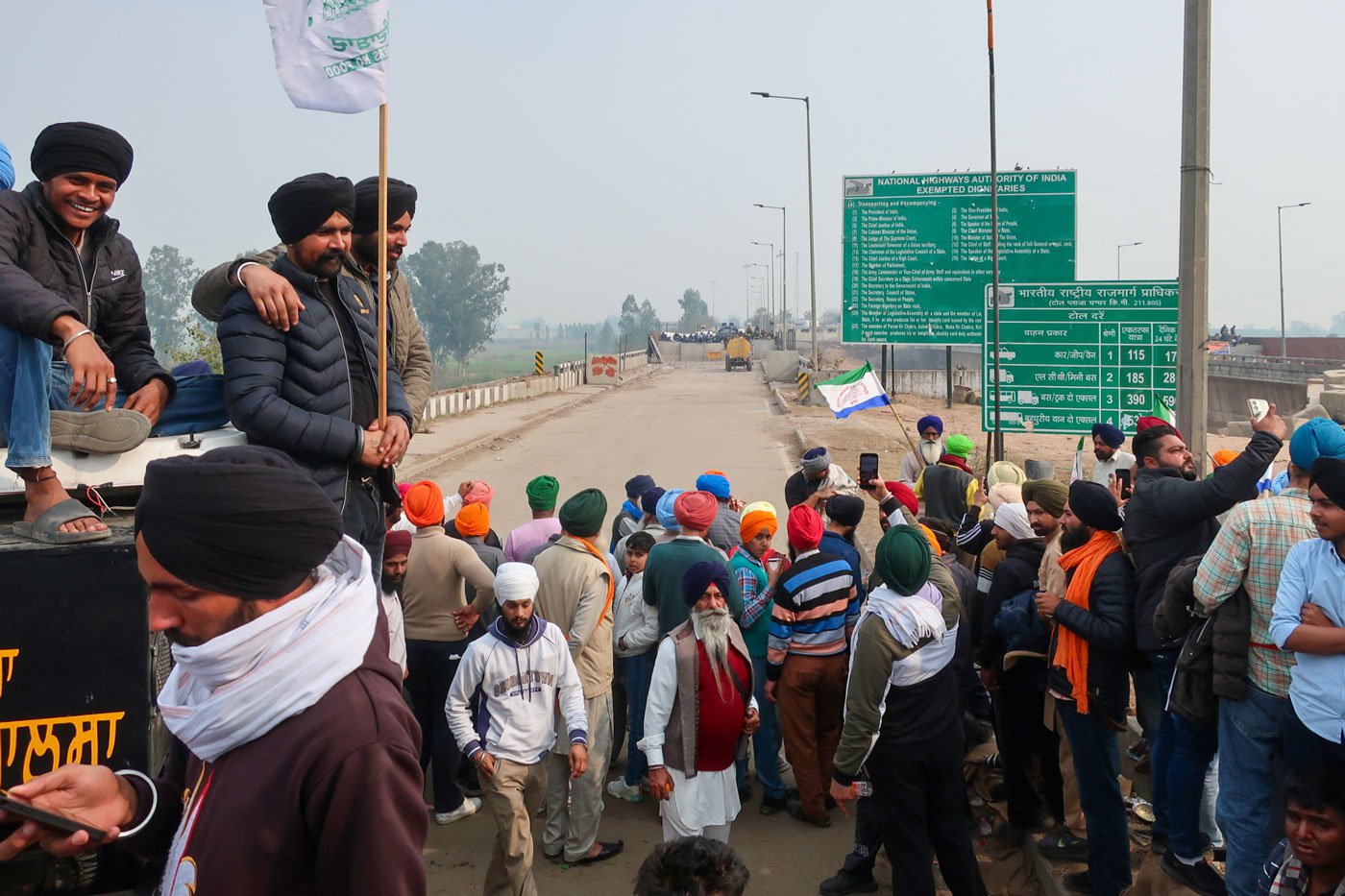
![‘They [BJP] do not have the right…’](/media/images/01-IMG_2898-AA-They_BJP_do_not_have_the_right.width-270.jpg)
